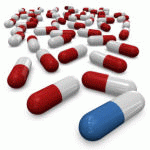Pharmacology
|
13 august 2017 13:51:14 |
| Marine Drugs, Vol. 15, Pages 254: Does Osmotic Stress Affect Natural Product Expression in Fungi? (Marine Drugs) |
|
Tweet The discovery of new natural products from fungi isolated from the marine environment has increased dramatically over the last few decades, leading to the identification of over 1000 new metabolites. However, most of the reported marine-derived species appear to be terrestrial in origin yet at the same time, facultatively halo- or osmotolerant. An unanswered question regarding the apparent chemical productivity of marine-derived fungi is whether the common practice of fermenting strains in seawater contributes to enhanced secondary metabolism? To answer this question, a terrestrial isolate of Aspergillus aculeatus was fermented in osmotic and saline stress conditions in parallel across multiple sites. The ex-type strain of A. aculeatus was obtained from three different culture collections. Site-to-site variations in metabolite expression were observed, suggesting that subculturing of the same strain and subtle variations in experimental protocols can have pronounced effects upon metabolite expression. Replicated experiments at individual sites indicated that secondary metabolite production was divergent between osmotic and saline treatments. Titers of some metabolites increased or decreased in response to increasing osmolite (salt or glycerol) concentrations. Furthermore, in some cases, the expression of some secondary metabolites in relation to osmotic and saline stress was attributed to specific sources of the ex-type strains. |
| 151 viewsCategory: Biochemistry, Molecular Biology, Pharmacology |
 Marine Drugs, Vol. 15, Pages 253: A Dereplication and Bioguided Discovery Approach to Reveal New Compounds from a Marine-Derived Fungus Stilbella fimetaria (Marine Drugs) Marine Drugs, Vol. 15, Pages 253: A Dereplication and Bioguided Discovery Approach to Reveal New Compounds from a Marine-Derived Fungus Stilbella fimetaria (Marine Drugs)Marine Drugs, Vol. 15, Pages 256: Nine New Triterpene Glycosides, Magnumosides A1-A4, B1, B2, C1, C2 and C4, from the Vietnamese Sea Cucumber Neothyonidium (=Massinium) magnum: Structures and Activities against Tumor Cells Independently and in Synergy with Radioactive Irradiation (Marine Drugs) 
|
| blog comments powered by Disqus |
MyJournals.org
The latest issues of all your favorite science journals on one page
The latest issues of all your favorite science journals on one page



